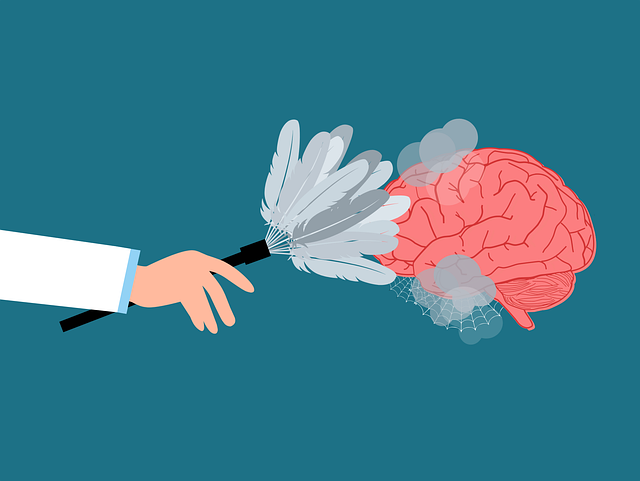Broomfield Men's Issues Therapy (BMIT) offers a specialized, data-driven approach to men's mental wellness, using evaluation tools like self-report, clinical interviews, and behavioral observations to track progress. Combining these methods with client feedback surveys, BMIT ensures personalized support for each participant's unique emotional needs. Continuous improvement is prioritized through analysis of outcome metrics, allowing program coordinators to tailor services effectively, fostering sustainable self-care routines and enhancing the overall therapeutic experience.
Mental wellness programs require robust evaluation methods to measure their impact and effectiveness. This article explores the comprehensive assessment strategies employed in the context of Broomfield Men’s Issues Therapy, a pioneering program focusing on male mental health. We delve into various evaluation techniques, from traditional metrics to client feedback surveys, to understand how these tools gauge success. By examining these methods, we highlight the importance of continuous improvement, ensuring that programs like Broomfield adapt and optimize their approaches based on valuable insights gathered through evaluation.
- Understanding Broomfield Men's Issues Therapy: A Foundation for Evaluation
- Assessing Program Effectiveness: Tools and Metrics
- Client Feedback and Satisfaction Surveys: Voices of Change
- Continuous Improvement: Adapting the Program Based on Evaluation Findings
Understanding Broomfield Men's Issues Therapy: A Foundation for Evaluation

Broomfield Men’s Issues Therapy (BMIT) offers a unique and tailored approach to mental wellness, focusing on the specific challenges faced by men. This therapeutic program recognizes that men often struggle with different emotional aspects compared to their female counterparts, hence its specialized nature. BMIT aims to create a safe space for men to explore and address issues related to emotional regulation and intelligence. By facilitating open conversations, the therapy helps participants develop strategies to manage stress, anxiety, and other mental health concerns, which are prevalent among men but often go unnoticed or unaddressed.
The evaluation methods employed by BMIT are designed to track individual progress and ensure the program’s effectiveness. These assessments include self-report questionnaires, clinical interviews, and behavioral observations, all of which provide valuable insights into a participant’s emotional well-being. Through these evaluations, the therapy can identify specific areas of improvement, such as enhanced emotional intelligence, better coping mechanisms, and reduced symptoms of depression prevention. This data-driven approach allows for personalized adjustments to the program, ensuring that each man receives the most beneficial support tailored to his unique mental health needs.
Assessing Program Effectiveness: Tools and Metrics

Evaluating the effectiveness of a mental wellness program is a multifaceted process that requires a toolkit of diverse assessment methods. These tools are essential for understanding the impact and outcomes of interventions aimed at improving mental health, particularly in contexts like Broomfield Mens Issues Therapy. One key metric is participant self-reporting through surveys or interviews, which can gauge individual perceptions of their mental well-being before, during, and after the program. This qualitative data provides insights into changes in symptoms, mood, and overall functioning.
Additionally, quantitative metrics such as standardized psychological assessments and behavioral observations can offer more objective measures of progress. These might include tracking improvements in areas like stress reduction, emotional regulation, or social interaction skills. By combining self-care practices and compassion cultivation techniques, which are increasingly recognized as valuable components of holistic therapy, programs can better support individuals in developing sustainable self-care routines for better mental health.
Client Feedback and Satisfaction Surveys: Voices of Change

Client Feedback and Satisfaction Surveys are powerful tools in evaluating mental wellness programs, offering a direct line to the voices of those who have benefited from Broomfield Mens Issues Therapy (BMIT). These surveys provide valuable insights into the client experience, allowing for continuous improvement in services. Through structured questionnaires, BMIT collects feedback on various aspects of therapy, including the effectiveness of Self-Awareness Exercises and their impact on personal growth. Clients are encouraged to share their experiences with Trauma Support Services, highlighting improvements in self-esteem and overall mental well-being.
The data gathered from these surveys not only demonstrates the success stories within BMIT but also guides future programming. By listening to client feedback, therapists can adapt their approaches, ensuring that Self-Esteem Improvement remains a core focus. This iterative process fosters an environment where clients feel heard and respected, ultimately enhancing their therapeutic journey.
Continuous Improvement: Adapting the Program Based on Evaluation Findings

Effective mental wellness programs recognize the importance of continuous improvement. Evaluation findings serve as a powerful tool to adapt and enhance the offerings, ensuring they remain relevant and beneficial for the target audience, such as men seeking therapy in Broomfield. By closely examining the outcomes and participant feedback, program coordinators can identify areas that need refinement or additional support. This process involves analyzing various metrics, including changes in symptom severity, improvements in coping skills development, and enhanced emotional healing processes.
Through these evaluations, the program can be tailored to better address specific challenges faced by individuals. For instance, if stress reduction methods are found to be particularly effective, more resources can be allocated to expand on these techniques. Conversely, if certain aspects of the program are perceived as less engaging or impactful, adjustments can be made to make them more appealing and beneficial, fostering a more inclusive and successful therapeutic environment for men in Broomfield seeking mental health support.
The evaluation of mental wellness programs, such as Broomfield Men’s Issues Therapy, is a multifaceted process that involves assessing program effectiveness using tailored tools and metrics. Incorporating client feedback through satisfaction surveys empowers the program to identify areas for improvement and ensure it addresses the unique needs of its participants. By continuously refining the program based on these evaluations, Broomfield Men’s Issues Therapy can optimize its impact, fostering better mental wellness outcomes for men in the community.









